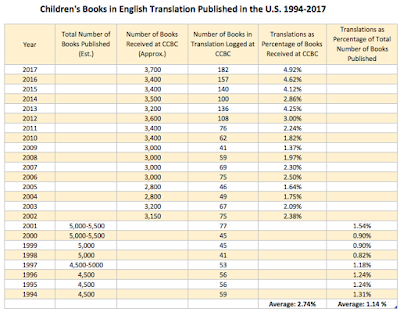 |
| #WorldKidLit Month image (c) Elina Braslina |
A #WorldKidLit Month and International Translation Day post.
Earlier this year, I published a post called On Women in Translation, which showed that
• Prominent translations for US children feature women authors, from western cultures; and
• Translations for US children are vanishingly few.
To find out about prominent translations for US children, I had looked at winners of the ALSC Batchelder Award, which for fifty years has garlanded translations for children published in the US.
In today’s post, I would like to share findings about a group I could not introduce fully in that post: male authors of prominent translations for US children. Here is what I found.
Prominent Translations for US Children by Male Authors Also Tend to Come from Western Cultures
Using exactly fifty years’ worth of Batchelder data, I found (click to enlarge):
 |
| Authors of Batchelder Award Winners by Gender |
 |
| Languages of Male Authors of Batchelder Award Winners, by Region |
Over fifty years, 1968-2018, 46% of Batchelder Award titles were authored by men. Of these, 83% were written in European languages.
Note: Language can belie culture of origin. Rafik Schami, author in German of A Hand Full of Stars, 1991 Batchelder winner, grew up in Syria and set his story in Damascus.
Looking at Batchelder Honor Books:
 |
| Authors of Batchelder Honor Winners by Gender |
 |
| Languages of Male Authors of Batchelder Honor Winners, by Region |
Over twenty-eight years (1991-2018), 38% of Batchelder Honor titles were authored by men. Of these, 67% were written in European languages.
What I learned: as with women, men writing in languages of cultures that contrast highly with the US were under-represented.
As I noted in my last post, most of the world’s languages have been absent entirely from the Batchelder lists, including Arabic, Bengali, Chinese (China), Croatian, Hindi, Hungarian, Korean, Malay, Nepali, Persian, Polish, Punjabi, Swahili, Thai, Ukrainian, and Urdu. These are all languages of countries with national sections of IBBY, suggesting that children’s literary scenes exist.
Translations likely to be accessed by US children that have male authors, were also predominantly authored in European languages.
Will New Batchelder Award Criteria Change this Picture?
When I combined all genders of authors of Batchelder Award and Honor books over time, I found:
 |
| Languages of All Authors of Batchelder Award and Honor Winners, by Region |
In the next fifty years, will the balance among the bars in this graph change?
One factor that may affect the answer is a change in Batchelder Award critera. Recently, an award evolution committee determined that books originally published in a language other than English, published in English translation overseas, and then subsequently published in English in the US, will be eligible for the award. (Previously, books published in English translation abroad and subsequently published in the US were ineligible.)
This could conceivably bring greater prominence in the US for books written by authors in non-western cultures. Books written in non-European languages are often a risk to publish Stateside due to the work needed to translate, edit and market them for US readers. If a book from, say, Asia, gets published with success in the UK, a US publisher could find it easier to risk publishing it, since it now has a sales record in an English-reading country and is translated. The fact that such a book could now win a Batchelder might mean that more such books attain prominence in the US—because Batchelder books are likely to be stocked in school libraries.
In the last Batchelder Award cycle, the novel Bronze and Sunflower by Chinese male author Cao Wenxuan, translated by SCBWI member translator Helen Wang, was ineligible due to having been published first in the UK. Now a work like this could win the award.
 |
| Read more about Bronze and Sunflower and the author here. |
Will the new criteria bring about a change in where our children’s books are written? Time will tell. Meanwhile, it’s up to US consumers and publishers to notice how translations—all translations—remain a tiny sliver of our children’s publishing output.
Data source: Cooperative Children’s Book Center (CCBC) Translated Book Logs and overall book counts
 |
| What Three Percent Looks Like |
To promote world literature, SCBWI welcomes not only international writers and illustrators, but also translators, who in 2014 became the third professional category of members. Translators are now part of 60 SCBWI regions, including 38 US regions. Reach out to translators to learn more about the world of world literature. Info: itc@scbwi.org
Avery Fischer Udagawa serves as SCBWI International Translator Coordinator.


2 comments:
I would like to add a comment to my own post, pointing out that the gender balance among authors who get translated, is far more skewed in favor of men if one looks at adult literature. Meytal Radzinski, founder of Women In Translation Month (August), provides excellent information in her blog posts and an FAQ here:
http://biblibio.blogspot.com/
Here is an interview with Meytal Radzinski at the website of the American Literary Translators Association:
http://www.literarytranslators.org/blog/women-translation-interview-meytal-radzinski
I would like to add a comment to my own post, pointing out that the gender balance among authors who get translated, is far more skewed in favor of men if one looks at adult literature. Meytal Radzinski, founder of Women In Translation Month (August), provides excellent information in her blog posts and an FAQ here:
http://biblibio.blogspot.com/
Here is an interview with Meytal Radzinski at the website of the American Literary Translators Association:
http://www.literarytranslators.org/blog/women-translation-interview-meytal-radzinski
Post a Comment